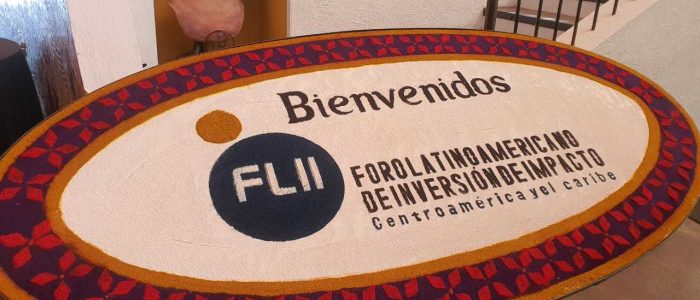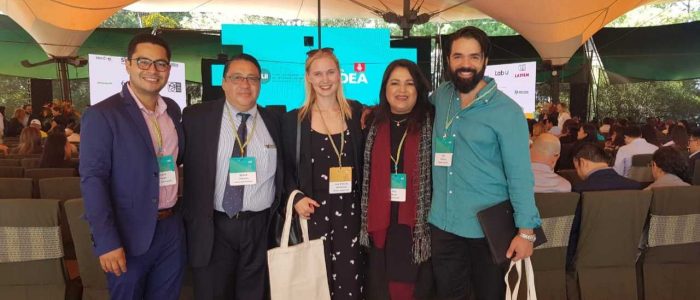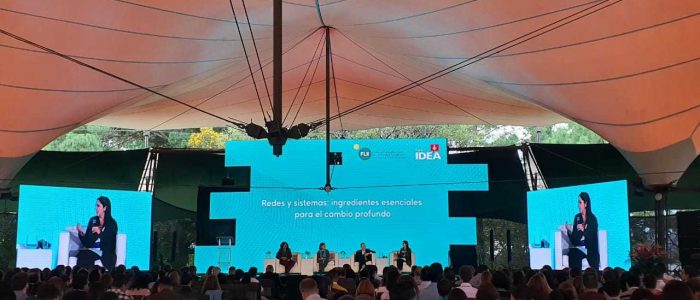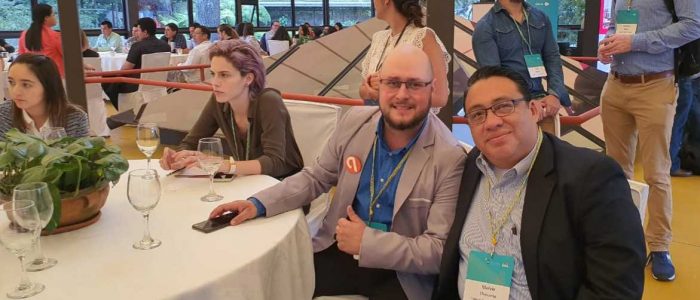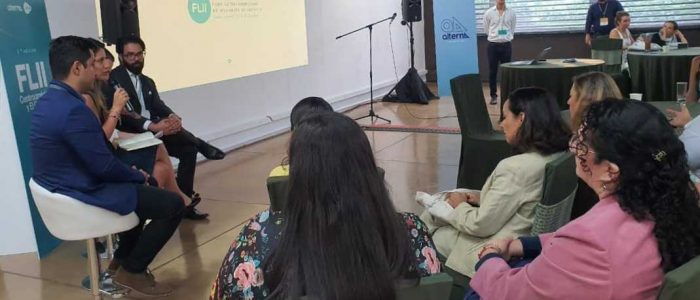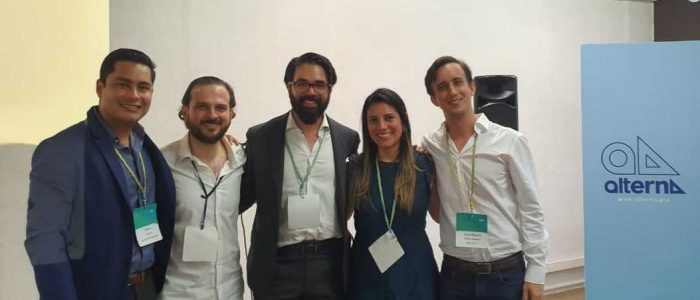La 5ta edición del Foro Latinoamericano de Inversión de Impacto (FLII), está proponiendo una agenda con diez rutas que abordarán los Objetivos de Desarrollo Sostenible (ODS). Durante dos días, organizaciones, inversionistas y emprendedores tejerán las rutas propuestas para crear un desarrollo sostenible en centroamérica y el caribe.
“Empresas de Impacto” – ODS 8,9,12 – fue uno de los ejes de discusión en el FLII; evento Latinoamericano que reunió a organizaciones, y programas proveedores de servicios empresariales, con el fin de compartir su experiencias y dotar de conocimientos a emprendedores que puedan tener modelos de negocios escalables, y soluciones de alto impacto.
Nuestros fundadores, Denis Pavón y Melvin Chavarría, fueron parte de este encuentro en representación de Impact Hub Managua. En conjunto con ADA Luxemburgo, tuvimos la oportunidad de becar a dos empresas a vivir este foro con los fundadores. El YES fund initiave permitió que Fernando Luna Gerente general de Plenus y Saulo Zeledón, co-fundador de AGC Agro Contro pudieran viajar a FLII y conectar con potenciales clientes, socios, e inversionistas.
Durante el foro Denis pudo compartir en un panel las experiencias que vivimos en el recién concluido Programa de Incubación auspiciado por BID-Lab. Emprendedores Resilientes, fue el primer programa que desarrolló Impact Hub Managua y gracias a esto pudimos becar a 70 empresas, que necesitaban redefinir y fortalecer su modelo de negocio.
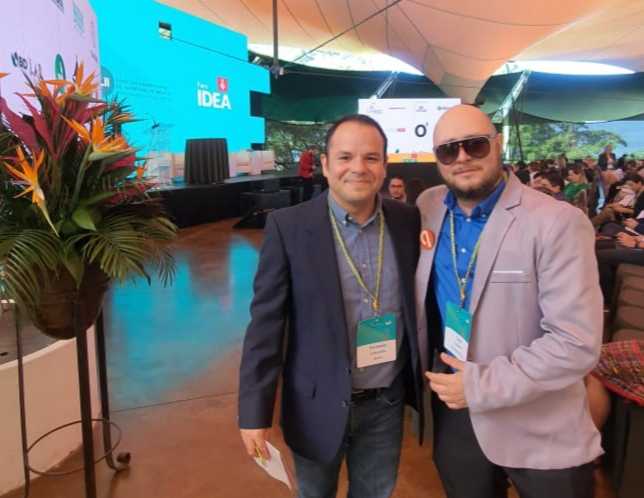
Al poco tiempo, y luego de haber graduado a nuestros emprendedores en el evento regional RIC, empresas como Plenus y AGC- Agro control empezaron a tener un crecimiento notorio. Plenus comentó que su cartera aumentó un 80%. AGC- Agro control, manifestó que el programa les ayudó a mejorar la comunicación con posibles aliados e inversionistas, lo cual se ha traducido en negociaciones para desarrollar futuros proyectos.
Si quieres saber más de este programa y su culminando RIC 2019, te invitamos a leer esta nota realizada por nuestros amigos de Niú. Evento conecta a emprendedores con inversionistas
El compromiso de Impact Hub Managua es contribuir en la formación empresarial y ser parte del FLII Guatemala permitirá que junto a todo el ecosistema emprendedor latinoamericano se desarrollen nuevas rutas de impacto.
En Managua, 6 de cada 10 negocios no llevan ninguna clase de registro contable, de acuerdo con la Cartografía Digital y el Censo de Edificaciones del Banco Central de Nicaragua (BCN). Estas estadísticas permiten visualizar una de las barreras que enfrentan las micro, pequeñas y medianas empresas (Mipymes) en materia financiera. Tomando en cuenta este elemento cabe preguntarse, ¿Cómo es posible lograr la sostenibilidad financiera de los negocios, si no se lleva registro de los recursos con los que se cuenta? La falta de registro es el primer reto hacia la sostenibilidad.
Además de la elaboración de registros de ingresos y egresos de forma periódica, es necesaria la creación de un plan de acción financiero de corto y mediano plazo para estructurar los pasos a seguir en materia financiera.
Para un manejo eficiente de los recursos financieros el emprendedor debe conocer cada uno de los procesos del negocio y sus costos. La construcción de un flujo de efectivo, puede ser una herramienta de apoyo pues le permitirá al emprendedor determinar la capacidad de la empresa para: generar efectivo y pagar las obligaciones del negocio, en un periodo determinado. Esta herramienta le permitirá al emprendedor mejorar la gestión interna, tomar decisiones de inversión e incluso negociar condiciones de pago del producto o servicio que oferta.
Además de la realización de los registros financieros es necesario que el emprendedor entienda la información contenida en estos registros y los utilice para la toma de decisiones, ya sea el seguimiento de un plan de recaudación de fondos, diversificación de ingresos, reducción de gastos operativos y generación de economía de escala.
Ana María Gutiérrez, especialista en finanzas explica que en la búsqueda de la sostenibilidad de los negocios, interviene también la organización de los recursos disponibles, y la visualización de pasos a seguir una vez el negocio esté en marcha.
El cambio climático y la pérdida de la capa de ozono es uno de los problemas principales para la vida humana los cuales deben ser asumidos lo antes posible por todos y con responsabilidad; según Foro Nacional de Reciclaje (FONARE) el 60% de la basura que produce el país es orgánica, y un 40% inorgánica, sin embargo esta basura orgánica no es totalmente reciclada.
Soluciones con Impacto
Bio-S es una empresa nicaragüense que nace del deseo y la necesidad urgente de comprometerse a realizar acciones que logren cambios en el medio ambiente y contribuyan a la salud, este compromiso los ha motivado a ofrecer una línea de productos 100% biodegradables a base de fécula de maíz, pajillas de bambú y toallas menstruales de tela como alternativas que ayudan a reducir el uso de plásticos.
La idea de Bio-S nace en septiembre del 2017 e inició operaciones en mayo del 2018, co-fundada por Alexa Hermida y María José García, dos jóvenes nicaragüenses con el anhelo de proteger el medio ambiente, y con el compromiso de realizar acciones que logren grandes cambios en el ecosistema.
Según Alexa una de las experiencia más hermosas ha sido convencer a negocios sobre trabajar con materiales biodegradables, expresa que al principio había mucha negativa, sin embargo al final los consumidores pedían en los negocios este tipo de envases amigables al medio ambiente.
Bio-S actualmente forma parte del equipo de emprendedores de la comunidad global de Impact Hub con el objetivo de adquirir habilidades para desarrollar su negocio; a través del programa de incubación Bio-S ha logrado generar ideas, y tener una visión más clara del proceso que debe tener su negocio para lograr su objetivo.
Comentan que importar y distribuir este tipo de envases biodegradables en el país las ha llevado a leer sobre compuestos químicos, para conocer las medidas que deben tomar al comprar e importar estos desechables; por el momento Bio-S solo produce la pajilla de bambú e importa las toallas menstruales y los desechables de fecula de maiz.
María José afirma que “en unos años, vamos a estar produciendo y distribuyendo nuestros propios envases y toallas femeninas, tenemos hecho algunos prototipos que hemos logrado trabajar poco a poco, es un proceso largo y difícil pero con buena compañía y compromiso es posible.Anhelamos ser la empresa líder de productos biodegradables en Nicaragua, es una meta que nos hemos propuesto.
Realizado por: Xochitl Bermudez y Léxica Ortíz
qwesdqqsqsdqsdqsdsdq
First district – Innere Stadt
The first district synonymous with luxury, posh clothes and shoes. Fancy bars and restaurants. Yet, luxury doesn’t need to be a one-way street. With the growing number of sustainable restaurants, why not treat yourself while simultaneously indulging the earth for a change? Eating more plant-based is a delicious way to help save the planet. After all, animal agriculture is one of the leading causes of pollution and global warming. What better way to stand up for Mother Earth than relishing in the delicacies served at the many vegetarian or vegan restaurants of the first district?
Yamm is exactly as yummy as it sounds. Many think it is one of the best vegetarian restaurants in town – I can certainly not argue with that. Whether for breakfast, lunch, coffee or after.
Time and again, Vienna ranks as the city with the highest standard of living. Yet, how does it hold up when it comes to sustainability? According to the World Economic Forum, we might not be the alpha of the pack, but still going pretty strong, coming fourth. Why? Of course, sustainable city policies play a huge part but what really shakes things up is the vibrancy of the Vienna start-up scene.
Whether you are a tree-hugger or more of a pragmatic spirit, to most of us it’s clear that taking better care of our planet would essentially be a good thing. If it only weren’t so damn difficult without the right infrastructure and incentives.
Fear not, because this is where sustainable entrepreneurs and their start-ups come in to save the day: new shops and projects keep popping up like mushrooms, which makes it increasingly easy for the environmentally-minded to turn their principles into practice.
In this post, I will take you through Vienna’s inner districts, showing you that so much of what your green heart desires is already here. And rest assured – this is only the beginning!
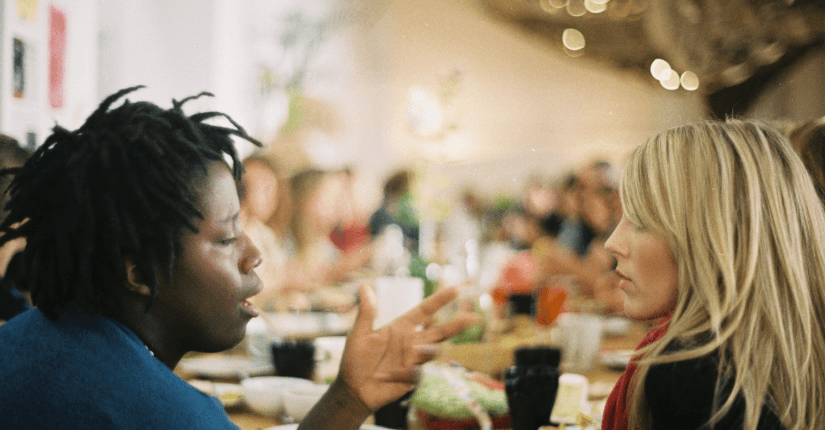
First district – Innere Stadt
The first district synonymous with luxury, posh clothes and shoes. Fancy bars and restaurants. Yet, luxury doesn’t need to be a one-way street. With the growing number of sustainable restaurants, why not treat yourself while simultaneously indulging the earth for a change? Eating more plant-based is a delicious way to help save the planet. After all, animal agriculture is one of the leading causes of pollution and global warming. What better way to stand up for Mother Earth than relishing in the delicacies served at the many vegetarian or vegan restaurants of the first district?
Yamm is exactly as yummy as it sounds. Many think it is one of the best vegetarian restaurants in town – I can certainly not argue with that. Whether for breakfast, lunch, coffee or after.
Time and again, Vienna ranks as the city with the highest standard of living. Yet, how does it hold up when it comes to sustainability? According to the World Economic Forum, we might not be the alpha of the pack, but still going pretty strong, coming fourth. Why? Of course, sustainable city policies play a huge part but what really shakes things up is the vibrancy of the Vienna start-up scene.
Whether you are a tree-hugger or more of a pragmatic spirit, to most of us it’s clear that taking better care of our planet would essentially be a good thing. If it only weren’t so damn difficult without the right infrastructure and incentives.
Fear not, because this is where sustainable entrepreneurs and their start-ups come in to save the day: new shops and projects keep popping up like mushrooms, which makes it increasingly easy for the environmentally-minded to turn their principles into practice.
In this post, I will take you through Vienna’s inner districts, showing you that so much of what your green heart desires is already here. And rest assured – this is only the beginning!
Time and again, Vienna ranks as the city with the highest standard of living. Yet, how does it hold up when it comes to sustainability? According to the World Economic Forum, we might not be the alpha of the pack, but still going pretty strong, coming fourth. Why? Of course, sustainable city policies play a huge part but what really shakes things up is the vibrancy of the Vienna start-up scene.
Whether you are a tree-hugger or more of a pragmatic spirit, to most of us it’s clear that taking better care of our planet would essentially be a good thing. If it only weren’t so damn difficult without the right infrastructure and incentives.
Fear not, because this is where sustainable entrepreneurs and their start-ups come in to save the day: new shops and projects keep popping up like mushrooms, which makes it increasingly easy for the environmentally-minded to turn their principles into practice.
In this post, I will take you through Vienna’s inner districts, showing you that so much of what your green heart desires is already here. And rest assured – this is only the beginning!
Time and again, Vienna ranks as the city with the highest standard of living. Yet, how does it hold up when it comes to sustainability? According to the World Economic Forum, we might not be the alpha of the pack, but still going pretty strong, coming fourth. Why? Of course, sustainable city policies play a huge part but what really shakes things up is the vibrancy of the Vienna start-up scene.
Whether you are a tree-hugger or more of a pragmatic spirit, to most of us it’s clear that taking better care of our planet would essentially be a good thing. If it only weren’t so damn difficult without the right infrastructure and incentives.
Fear not, because this is where sustainable entrepreneurs and their start-ups come in to save the day: new shops and projects keep popping up like mushrooms, which makes it increasingly easy for the environmentally-minded to turn their principles into practice.
In this post, I will take you through Vienna’s inner districts, showing you that so much of what your green heart desires is already here. And rest assured – this is only the beginning!
Time and again, Vienna ranks as the city with the highest standard of living. Yet, how does it hold up when it comes to sustainability? According to the World Economic Forum, we might not be the alpha of the pack, but still going pretty strong, coming fourth. Why? Of course, sustainable city policies play a huge part but what really shakes things up is the vibrancy of the Vienna start-up scene.
Whether you are a tree-hugger or more of a pragmatic spirit, to most of us it’s clear that taking better care of our planet would essentially be a good thing. If it only weren’t so damn difficult without the right infrastructure and incentives.
Fear not, because this is where sustainable entrepreneurs and their start-ups come in to save the day: new shops and projects keep popping up like mushrooms, which makes it increasingly easy for the environmentally-minded to turn their principles into practice.
In this post, I will take you through Vienna’s inner districts, showing you that so much of what your green heart desires is already here. And rest assured – this is only the beginning!

